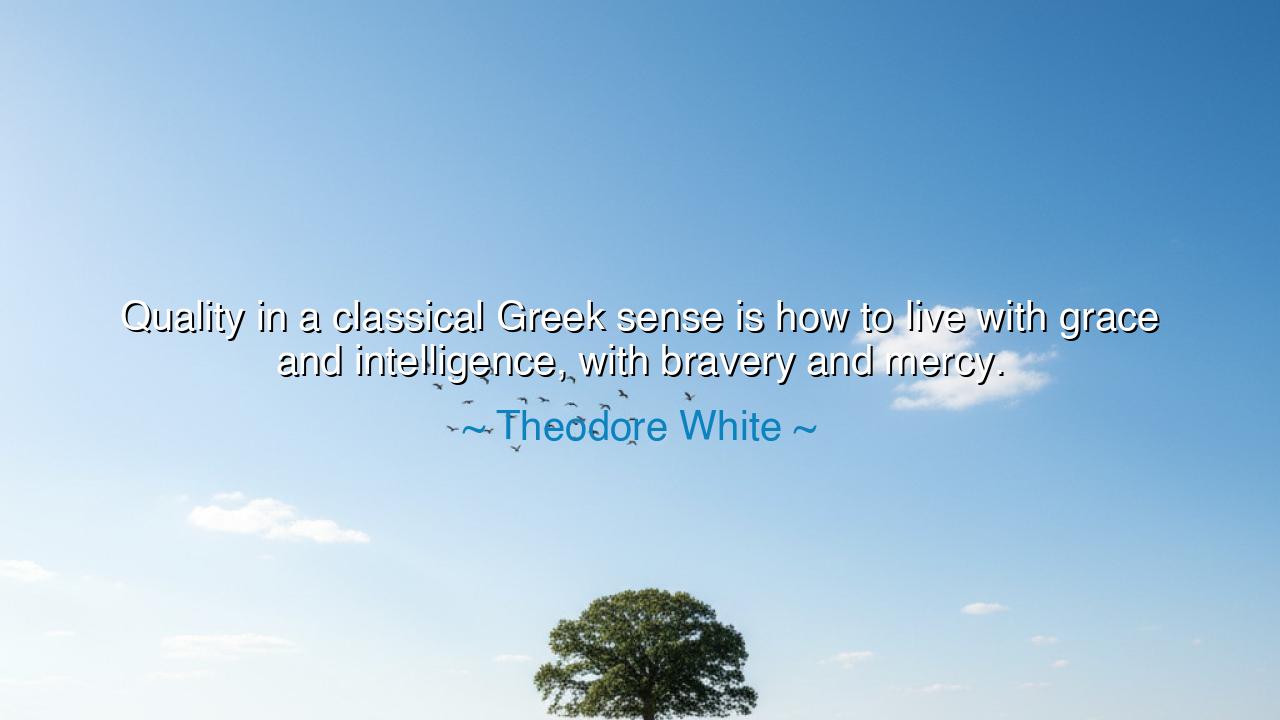
Quality in a classical Greek sense is how to live with grace and
Quality in a classical Greek sense is how to live with grace and intelligence, with bravery and mercy.






In the wise words of Theodore White, "Quality in a classical Greek sense is how to live with grace and intelligence, with bravery and mercy," we are called to reflect on the timeless virtues that define the true character of a person. These words, rooted in the ancient ideals of Greek philosophy, offer us a profound guide to how we should aspire to live our lives—not in the pursuit of riches or fame, but in the cultivation of a life well-lived. For the Greeks, quality was not merely about skill or achievement, but about living with a balance of virtues that elevate the soul and enrich society.
The Greek philosopher Aristotle taught that the highest form of human life was one that achieved eudaimonia, or flourishing, through the pursuit of virtue. Aristotle believed that virtue was a balance, a "golden mean" between extremes, where a person would cultivate qualities like courage without falling into recklessness, and generosity without descending into excess. When White speaks of living with grace and intelligence, he echoes Aristotle's call for wisdom—the ability to navigate life with both the mind and the heart aligned, making decisions that are both rational and compassionate. This kind of grace is not about ease or luxury, but about navigating the challenges of life with an inner calm, with dignity, and with purpose.
Consider the example of the great Pericles, the Athenian statesman who led Athens to its golden age. Pericles embodied the classical Greek virtues that White speaks of, as he ruled with a combination of wisdom, bravery, and mercy. Under his leadership, Athens flourished, not only as a political and military power, but as a hub of culture, philosophy, and democracy. Pericles was a leader who valued the intellect, and through his oratory skills and vision, he guided Athens through difficult times with both grace and intelligence. Yet he was also a man of bravery and mercy; during times of war, he made decisions that balanced the harsh realities of conflict with an awareness of the human cost of war. His life was a demonstration of the classical Greek ideal that a life well-lived is one that seeks balance—where intelligence is not used for self-aggrandizement but for the betterment of the whole, and where bravery is tempered with compassion for those who suffer.
Bravery and mercy, as mentioned by White, are not opposites but complementary forces in the classical Greek worldview. Bravery, in the Greek sense, is not blind courage, but the ability to stand firm in the face of fear for a noble cause, whether in war or in peace. However, mercy tempers this bravery by reminding us that true strength does not lie in dominance, but in compassion and forgiveness. The ancient Greeks revered Achilles for his bravery, but also saw the depth of his character in his moments of mercy—such as when he allowed the defeated Hector, his enemy, to have a proper burial. This act of mercy amidst the violence of war speaks to the ideal of living with both courage and compassion, qualities that are essential to the quality of life White describes.
In our own time, these virtues can seem distant, often replaced by the pursuit of power or personal gain. Yet, the lesson White imparts remains incredibly relevant. To live with grace and intelligence means to cultivate a deep understanding of ourselves and the world around us. It means to act with integrity, to seek knowledge not for selfish reasons, but to serve a higher good. The bravery White speaks of is not just the courage to face physical challenges but the courage to stand up for justice, to speak out against injustice, and to lead with wisdom and compassion. The mercy that accompanies bravery is the capacity to recognize the humanity in others, even those who may oppose us, and to act with compassion in the face of adversity.
The greatest leaders throughout history, from the philosophers of ancient Greece to the visionaries of the modern world, have exemplified these virtues. Nelson Mandela, for instance, showed immense bravery in his fight against apartheid, yet his ability to forgive his oppressors and seek reconciliation instead of revenge was a profound act of mercy that changed the course of history. His life was a testament to the idea that true leadership requires the balance of bravery and mercy, guided by a deep intelligence and grace in both public and private life.
Thus, we must take from White’s words a challenge to live with these virtues in mind. Quality, in the classical Greek sense, is not something that is achieved through accumulation or dominance, but through the cultivation of a balanced life—one that seeks wisdom, courage, compassion, and integrity. As we move through the world, let us strive to embody these ideals in our own lives. Let us not merely exist, but live with the grace of a philosopher, the bravery of a warrior, and the mercy of a true leader. Only then can we truly achieve the quality of life that Theodore White and the ancients envisioned—a life that is worthy of respect, admiration, and, most importantly, fulfillment.






AAdministratorAdministrator
Welcome, honored guests. Please leave a comment, we will respond soon